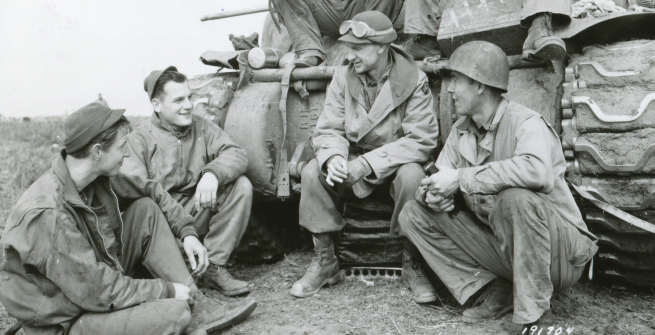April 18th marks National Columnists’ Day, started in memory of Pulitzer Prize winning journalist, Ernie Pyle, who was killed in World War II. His eloquence in his subject matter, the lives of everyday men in the world of war, struck a chord in America. Seeing their sons, brothers, and fathers go marching off to fight in distant lands, those left at home did not know what their families and friends went through.

Photo Courtesy: http://pressinamerica.pbworks.com/w/page/18360169/Ernie%20Pyle
Pyle was exceptional at not only humanizing the masses on the front lines, but the GI stories he shared with America were full of realism and spoke to what the soldiers meant to him and, in turn, to many Americans. It must be noted that, “Although his dispatches never glorified war, Pyle, more than any other correspondent, helped Americans to understand the true heroism and sacrifices of the GIs in battle.” It was important to Pyle that readers understood how cruel and exhausting wartime from a soldier’s perspective could be. Kevin Kawamoto, one of the writers at the Dart Center for Journalism & Trauma, wrote how journalists who “…are sensitive to the suffering of others and understand the complexity of emotional trauma are often able to write about traumatic experiences in a way that is informative, engaging and often helpful to readers.” The above epitomizes Pyle as a journalist and as a human. Pyle was ahead of his time in realizing that to go from a war zone to a neighborhood and a family was harder than many at home would have thought. As Pyle wrote,
Our men can’t make this change from normal civilians into warriors and remain the same people. Even if they were away from you this long under normal circumstances, the mere process of maturing would change them, and they would not come home just as you knew them. Add to that the abnormal world they have been plunged into, the new philosophies they have had to assume or perish inwardly, the horrors and delights and strange wonderful things they have experienced, and they are bound to be different people from those you sent away.3
Today, we as a society are more aware of Post-Traumatic Stress Disorder, before known mostly as “shell shock” or “battle fatigue,” but we can still learn from authors and the past in order to give our present the help it needs.
Pyle was incredibly influential on many, such as cartoonist Bill Mauldin, a Pulitzer-prize winning comic artist. Mauldin became prominent with his Willie and Joe cartoons about two ordinary GI’s. These cartoons dealt with the trials and tribulations of day-to-day soldiers and veterans. When Mauldin had been a soldier for three and a half years, Pyle wrote how “Mauldin’s cartoons in a way are bitter. His work is so mature… Yet he is only twenty-two… His maturity comes simply from a native understanding of things, and from being a soldier himself for a long time.”

Photo Courtesy: http://mediaschool.indiana.edu/erniepyle/wp-content/uploads/sites/19/2008/01/03_101
Both Mauldin and Pyle wrote succinct and pointed commentary that got to the heart of war. June 16, 1944 brought Pyle taking a walk along the coast of Normandy. With his painfully beautiful prose, he wrote, “It was a lovely day for strolling along the seashore. Men were sleeping on the sand, some of them sleeping forever. Men were floating in the water, but they didn’t know they were in the water, for they were dead.” Words such as these and so many others truly painted a realistic picture of wartime and the front. Hearts across America were then shattered on April 18, 1945 when Pyle was shot down by a machine gun just west of Okinawa. His memory lives on in journalists and historians, but nowhere more than at Indiana University where students can take a class on the life and work of Pyle culminating in a European trip that follows in his footsteps. Along with becoming an icon for journalists, Pyle’s in-depth writing about the truth of war resonates still and continues to inspire authors of all genres.
For further reading please find some compilations of Pyle’s work:
Brave men
Ernie’s America: the best of Ernie Pyle’s 1930s travel dispatches
Ernie’s war: the best of Ernie Pyle’s World War II dispatches
Here is your war
Last chapter
To read about Bill Mauldin’s life and work:
Bill Mauldin: a life up front by Todd DePastino
Mud & guts: a look at the common soldier of the American revolution
Willie & Joe: back home
Willie & Joe: the WWII years
